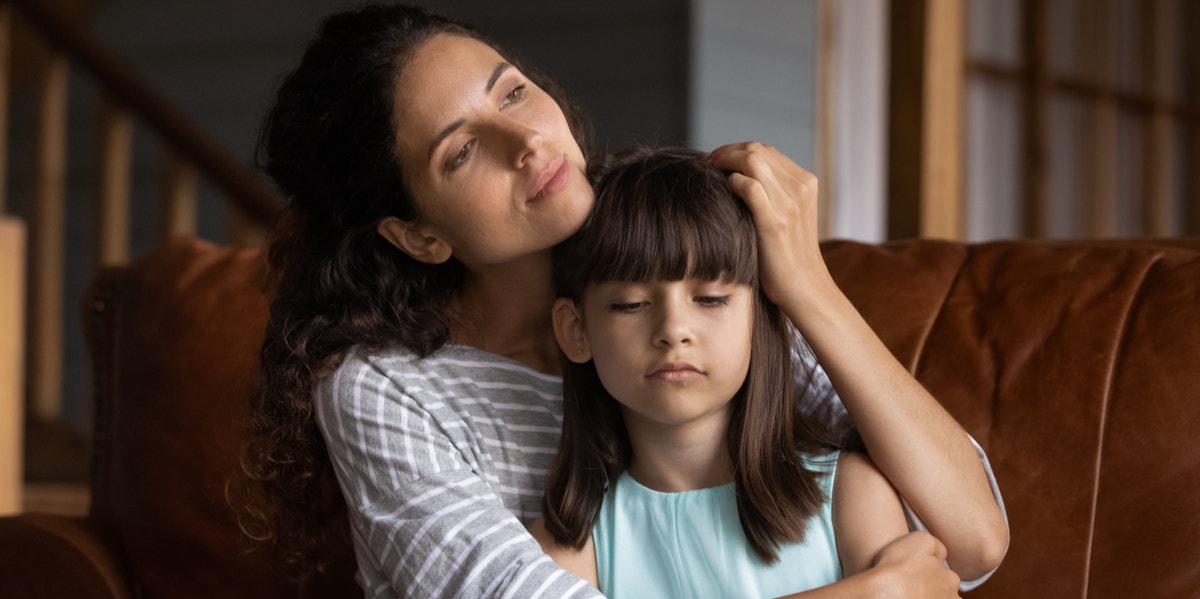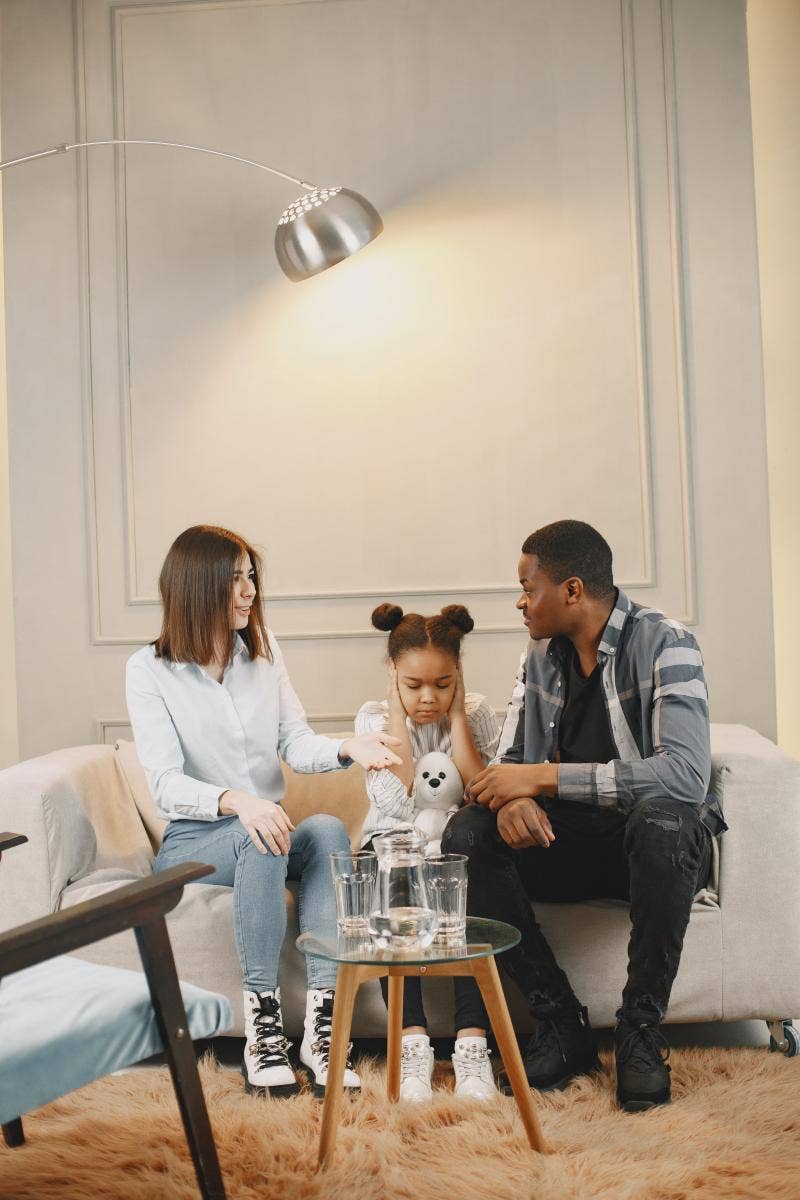4 Basic Things Children Of Divorce Want From Their Parents
How to handle your divorce while you have kids.
 fizkes / Shutterstock
fizkes / Shutterstock In 25 years of supporting people going through divorce and in the subsequent rebuilding of their lives, I’ve learned what the effects of divorce on children really are, and what children of divorce actually want from their parents.
I’ve often wished parents could see it sooner. I’ve wondered if some would ever see it. Some are so hurt by the emotional trauma that they simply can’t see beyond their own pain to consider another’s.
It can be a costly oversight in the form of anxiety, stress, anger, and low self-esteem for the children.
Here are 4 basic things children of divorce want from their parents:
1. Children of divorce want their parents to coexist
They want their parents to be able to be in the same place at the same time without conflict, avoidance, or angst.
They want their parents to be able to meet together with their teachers, to sit together at events, to cheer for them from the same bleacher, to pose with them for photos, and to celebrate their achievements together.
An 18-year-old boy told me his greatest stress in elementary school was playing in the school concert band. He always dreaded performances because his parents hated each other so much, yet both would show up.
He knew they would come and sit apart, seemingly competing for who could sit closer to his spot on the stage. He never knew where to look to try to find a supportive smile.
His stomach would ache, he would begin to feel sick, and he simply couldn’t wait for the concert to end. Afterward, he wouldn’t know who to go to first. He felt responsible for how they would feel.
He quit concert band in elementary school, quit soccer in high school, and later, quit his job.
Children want their parents to be there for them, not against each other.
2. Children of divorce want their parents to communicate respectfully
They want their parents to be adults, manage emotions, and behave responsibly. Children of divorce want their parents to STOP fighting and criticizing one another in front of them.
 Photo: Gustavo Fring/Pexels
Photo: Gustavo Fring/Pexels
They want their parents to be the grown-ups and to let them be the kids. They learned or are learning in kindergarten much about self-awareness, self-regulation, social awareness, and relationship skills.
They are expected to express their feelings appropriately while relating and connecting to others. Is this too much to ask of their own parents? Parents are the greatest teachers, and same-sex parents are their most influential ones.
A 14-year-old shared with me that she gets extremely upset hearing her parents fight about her. She said when they fight about her, it feels like it's her fault. It seemed what she wanted for herself wasn’t even what they were fighting about.
She also said that her parents would go weeks without communicating with one another and send messages through her. Then, she again feels at fault for one or the other being upset.
She said she sometimes wishes her divorced parents could feel what it’s like to be in the middle. She wants to hide in her room, not see anyone, and eat the snacks she hid there to try and feel better.
If she could go to her Grandma’s, she would. Grandma always makes the food she likes.
She developed an eating disorder and has ongoing issues with self-esteem.
The effects of divorce on children are often serious and the repercussions last into adulthood.
3. Children of divorce want their parents to cooperate in co-parenting
They want their best interests to be the focus. If there was an unhealthy, unhappy, high-conflict relationship in the home while married, believe me, the children are pro-divorce.
They do NOT want their parents to stay together for them. They do want to remain a top priority in their parents' separate lives. Often parents tell their children they are their number one priority, but their actions don't support that. This can make children feel insecure and unloved.
A 9-year-old boy told me that he felt he had to hide when his mother called or texted him when he was with his father. She just wanted to know how his soccer game went.
His father would react with anger, yelling and accusing her of stealing his time. The boy didn’t understand why her interest in his life would be so upsetting to his father. After all, he actually could have come to watch him play in person.
He stopped answering his mother’s calls and texts; he started hanging out with the wrong crowd.
A parent's relationship with their ex is not your child’s relationship with them. Imposing rules means that someday there might be a price to pay.
4. Children want their parents to commit to healing after going through a divorce
They want their parents to take responsibility for their lives. So many get stuck in their pain or avoid it, so they don’t do the work of grieving and letting go. They just run to the next thing without doing the reflection and learning the lessons from this period of their life.
Others, often those who may be on the victim end of betrayal, can become so defeated that they begin to betray themselves with their lifestyle choices.
Children of divorce want their parents to talk to someone about their problems. They want them to get the help they need to lead a well-balanced, stable life.
They are highly impacted by their parents' moods and their emotional, social, and financial struggles. Kids want to see their parents smile and hear them laugh.
Children want to play, have fun, and make memories with their divorced parents that will carry them through their lifetime.
A young girl once revealed to me that her mother was so sad all the time since her daddy moved out. She said that every time he called to ask about her day or tell her goodnight, mommy would cry.
This girl said she felt she had to go from being happy on the phone with her dad to comforting her mother, who had no one else to talk to.
She carried the burden of being a parent and friend to her mom until her mom sought support on her own.
Children want healthy, happy parents who take care of themselves and can take care of them, too.
The effects of divorce on children are often a mixed bag.
Children often feel confused and guilty during their parents' separation and divorce. It's a major life transition for everyone, and they're not equipped to experience the change and uncertainty.
When divorced parents agree to co-exist, communicate, cooperate, and commit to keeping the children’s best interests at the forefront of every encounter and transaction, that shows them that they're truly important.
It demonstrates that divorce redefines a relationship, it doesn’t end it. Parents have an opportunity to create something new and healthy to model for their children to take into their adulthood, instead of packing their baggage full of anxiety, stress, anger, and low self-esteem.
Divorced or separated parents should allow themselves to recover from heartbreak and disappointment, learn to manage stress, and regulate their emotions. In doing so, they give children the same capacity for resilience, happiness, and connection.
Ann Papayoti, PCC, is a relationship coach, author, and speaker who helps people help themselves through losses and transitions. She helps people untangle from their past and heal their hearts.

